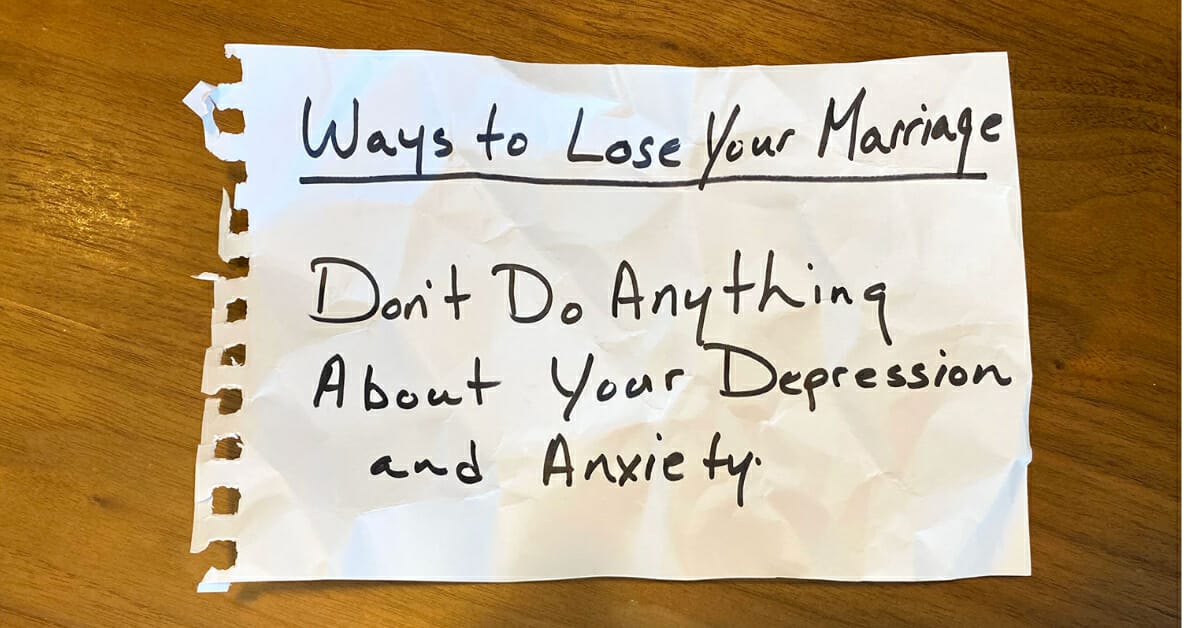Note: We are currently in a series called “The List.” The list refers to a list of ways you can lose your marriage, and is based on information gleaned from over 20 years of counseling records and watching marriage fail.
Depression and anxiety are so prevalent these days they’re like the emotional equivalent of the common cold. According to the Anxiety and Depression Association of America, at any point in time, 3 to 5 percent of people suffer from major depression; with the lifetime risk being about 17 percent. According to DoSomething.org, “anxiety disorders are the most common of mental disorders and will affect nearly 30% of adults at some point in their lives.”
Most people suffering from depression and anxiety will get married and bring those issues into their marriage. So, for the sake of their marriage, it’s important for spouses to do something about their depression and anxiety.
WHY IS IT IMPORTANT TO DO SOMETHING ABOUT YOUR DEPRESSION AND ANXIETY?
Depression and anxiety, if left unattended, can take over your marriage and drive the relationship. They become the CEO’s in your marriage. Here’s what I mean by that…
- C – Depression and anxiety are CONTAGIOUS in marriage. Your spouse will start exhibiting the same issues…or others in reaction to your depression and anxiety. Just as an injured leg will cause the rest of the body to limp to compensate, your spouse will limp trying to compensate for your depression or anxiety.
- E – Your depression and anxiety will be EXASPERATING to your spouse. These issues will serve as a constant impediment to your spouse when it comes to going places, getting things done, and enjoying life in general. (More about that below.)
- O – Depression and anxiety in a marriage are OPPRESSIVE to a marriage. They put a lid on how far the marriage can go and grow.
So, if depression and anxiety are that hard on a marriage…
WHY DO WE OFTEN TRY TO IGNORE THEM?
Why don’t more people do something about their depression and anxiety if it’s hurting their marriage? Here are some possible reasons:
- We don’t recognize it. Depression and anxiety can be hard to see when you’re in it. They can come on so gradually that It feels normal, and you don’t see the problem till you’re already deep into it.
- We’re embarrassed to admit it. Though it’s not as bad as it once was, there’s still a lot of stigmas associated with having depression and anxiety. We’re afraid people will see us as weak or broken.
- We want to handle it ourselves. Our pride and independence can get in the way of dealing with our depression and anxiety. We want to fix it on our own. But if we could do that, we would have already done it.
- We don’t trust counselors or medication. This reason goes hand-in-hand with the previous reason. We would rather do it ourselves because we’re afraid that counselors or medication will somehow mess us up and make us worse. I don’t have the space or time to totally refute this now, but let’s just say this is more of an excuse than a help.
WHAT CAN YOU DO ABOUT YOUR DEPRESSION AND ANXIETY?
I know it’s easy to feel powerless and helpless in the face of depression and anxiety, but you are not without options or resources. Here are just a few of the things you can do to address and combat your depression and anxiety:
- Improve your physical condition. It’s surprising what a difference taking care of yourself physically can make on depression and anxiety. I’m not saying that it will make you magically better, but diet, exercise, and proper sleep can have a big impact on depression and anxiety.
- Find a better work/life balance. Now, it’s not possible to completely and precisely balance your work and home life. There will be some ebb and flow between them from season to season. But if they get too out of balance for too long, it can lead to and feed depression and anxiety.
- Lean into spiritual resources. If you’re a person of faith, then leaning into the spiritual resources at your disposal can be a great source of comfort, strength, and direction for you.
- Talk to a pastor or counselor. It’s not possible for us to handle everything in life by ourselves. From time to time, we all need a little help from someone who’s more objective and has more training and resources than we do.
- Investigate possible medical help. If your depression and anxiety seem to be entrenched and unresponsive to the previous approaches, then it may have more to do with your biology than your thinking, faith, or circumstances. If you’ve tried everything else, but still struggle with depression and anxiety, then you may need to talk to your physician about the possible need for an anti-depressant or anti-anxiety medication.
WHAT CAN YOU DO IF IT’S YOUR SPOUSE WHO SUFFERS FROM DEPRESSION AND ANXIETY?
If you’re married to someone who struggles with depression or anxiety, you know what a strain it can put on your marriage. Here are some ways it can affect you…
- You can wind up exhausted and frustrated from picking up the slack for your spouse.
- This exhaustion and frustration can turn to anger and resentment.
- You can wind up lonely, because your spouse stays in bed, stays withdrawn, or is too anxious to do things.
- You can be faced with the choice of either staying at home all the time or getting out and doing things on your own.
- You can feel like your spouse’s depression and anxiety are cheating you out of the life, enjoyment, and marriage you wanted.
Since you can’t force your spouse out of their depression or anxiety, it can feel like your hands are tied. But there are some things you can do:
- Don’t avoid it or sweep it under the rug. The spouse with depression or anxiety already prefers to avoid the issue, so avoiding it just makes it worse.
- Be lovingly truthful with your spouse. They may not see how it’s affecting you and the marriage. Or they may see it and feel so down on themselves they can’t bring the subject up. So you bring it up. I know you don’t want to hurt your spouse, but you must be truthful about how their issues are affecting you and the marriage. Be kind, be loving, but be truthful.
- Ask/encourage them to take steps to improve things. Often, depression and anxiety can leave a person frozen and stuck. They may need your encouragement and gentle pushing to build some momentum. They probably won’t like it at first, but they may need it.
- Take care of yourself. Though you can’t force them to do what they need to do, you can take care of yourself. Make sure you’re getting a proper diet, along with proper sleep and exercise. Find someone you can talk to about what you’re going through; someone who will listen to you and help guard you against making rash decisions. You may even need to talk to a counselor or physician if things persist.
- Lean into your spiritual resources. If you’re a person of faith, find strength and guidance in the spiritual resources at your disposal.
A FINAL WORD…
This post is not intended to beat up those who struggle with depression or anxiety. Nor is it meant to make those people feel guilty. The purpose of this post is to (1) clearly make spouses aware of the impact depression and anxiety have on a marriage relationship and (2) encourage you to attack those issues with all your might. Because not doing anything about your depression and anxiety can cause you to lose your marriage. And that’s why…IT’S ON THE LIST.



